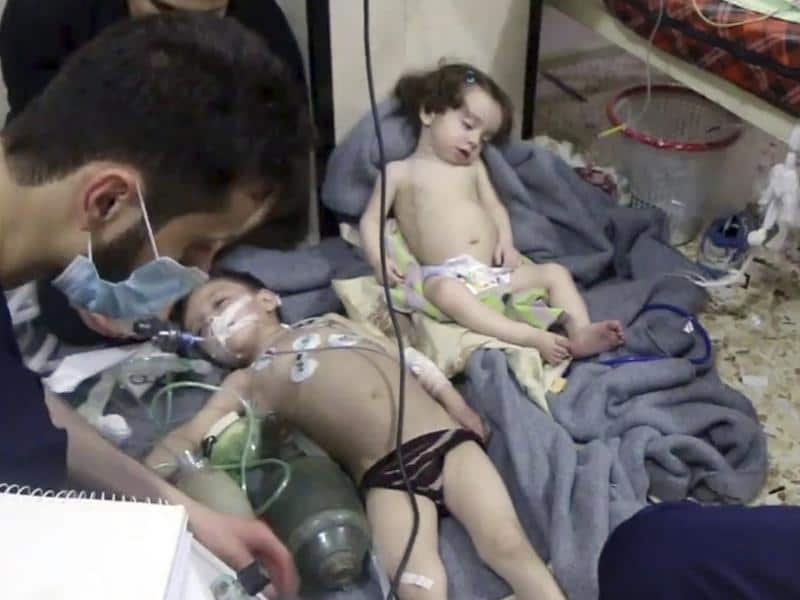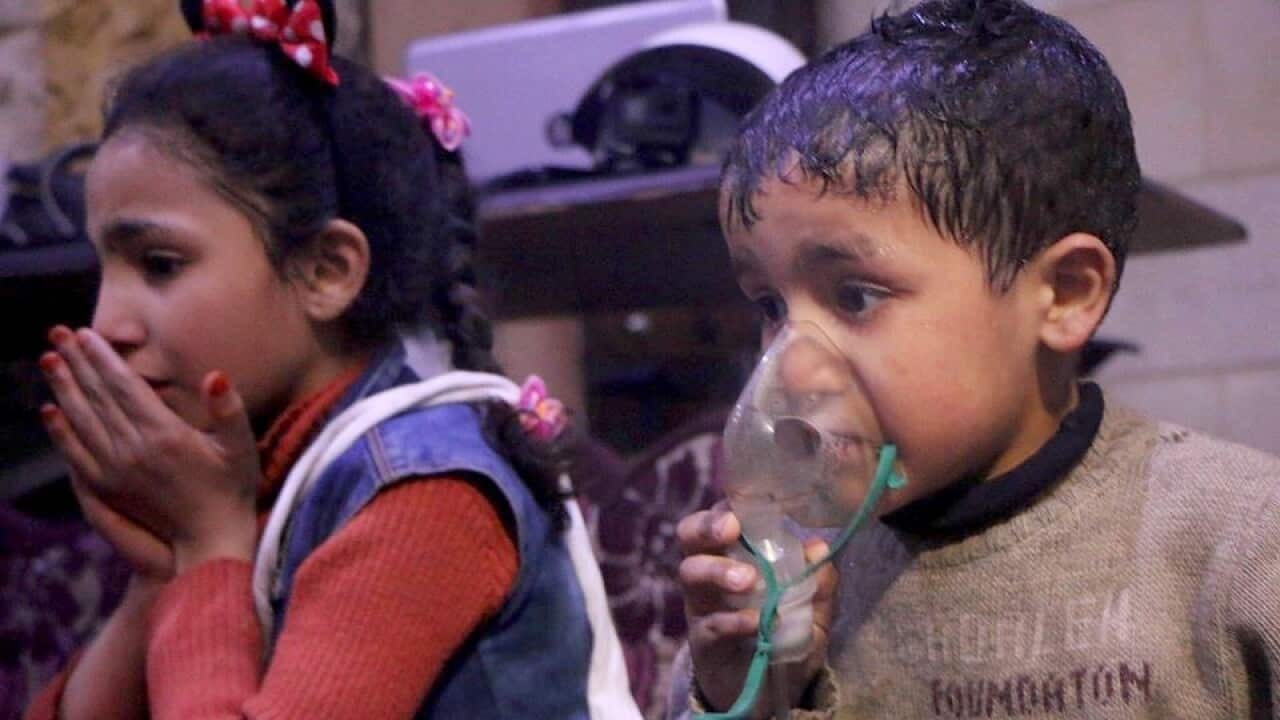WARNING: Distressing images.
Footage of young victims foaming at the mouth and weeping in agony thrust Syria's seven-year civil war to the forefront of world concern again.
Dozens of men, women and children were killed in the 7 April attack in Douma, according to relief organisations, adding to the conflict's total death toll of half a million people.
It prompted the US, France and Britain to carry out coordinated air strikes on chemical weapons sites in Syria.
But as footage and eyewitness accounts of the atrocity spread in the West, Russia pumped out an alternative version of events.
Russia's alternative reality
At first Russia denied an attack occurred at all, accusing the Syrian Civil Defence, known as the White Helmets, of using actors in an elaborate performance, before switching gears to suggest the substance hurting victims was merely dust rather than chlorine.
Then, it pointed the finger at Britain for orchestrating the attack.
"We have … evidence that proves Britain was directly involved in organising this provocation," defence ministry spokesman Igor Konashenkov said in the week following the attack.
Britain's UN Ambassador Karen Pierce was angered by the accusation.
"This is grotesque, it is a blatant lie, it is the worst piece of fake news we've yet seen from the Russian propaganda machine," Ms Pierce told reporters.

A suspected chemical attack on Douma left many, including children, fighting for their lives. Source: AAP
Debunking 'fake news'
Many international journalists have since discredited Russia's claims.
US freelance journalist Pat Hilsman, who covered the Syrian conflict on the ground from 2012 to 2015, cited an interview with an 11-year-old boy who told Russian state television that he had been forced to perform in the 'staged incident'.
"In the interview he is clearly scared, he’s being interviewed by Russian television and he essentially explains like in a hostage video he was sort of coerced into staging the event," Hilsman told SBS News on Monday.
He also rubbished Russian state media stories suggesting that civilians were suffering from dust-related issues:
"Implausible is not the right word. Garbage and dust have never teamed up to kill dozens of civilians before. It’s just not reality. It’s completely illogical."
Two Syrian medics who recounted their original stories and said patients showed no symptoms of being exposed to poison were interviewed by the military.
“That’s unacceptable by any journalism standards, that’s coercion,” Hilsman said, adding that it was likely the men had been threatened by the military.
British citizen journalist Eliot Higgins, who founded online investigations outfit , has also tracked down images that Russia claims are from a White Helmets 'film set'.
The photos were indeed from a film set in Syria, just not one used to plan a fake chemical weapons attack. They show actors, crew and props used in the film Revolution Man.
But Higgins isn't confident that his work will halt Russia's claims from spreading.
"Despite the ease of debunking this claim, it is almost certain that these images will continue to be used by those who wish to attack the White Helmets for months, if not years, to come," he wrote on his website.
Who is winning the information war?
While Russia's claims have been dismissed as illogical, Curtin University security expert Alexey Muraviev said it isn't the dominant view across the world.
"They would certainly be dominating Russian-language internet space which is fairly significant as well as its niche which it managed to secure in English-language spaces," he told SBS News.
Associate Professor Muraviev, who heads the Strategic Flashlight forum on national security and strategy, says it's also important to consider the views of third parties such as China, India and South America.
"I think the results there would be quite mixed, if not, more inclined to what the Russians are saying."
Dr Muraviev is himself not convinced that poisonous gas was used, saying more independent investigation was needed.
Russian media also seizes on western voices that express sympathy for its version of events or attacks their enemies.
"It worked very well for a very long time," Mr Hilsmen said. "If you type in White Helmets into Google, the type of stuff you’ll get is insane, it’s worse than if you type in OJ Simpson or Osama Bin Laden."
But Mr Hilsman says their willingness to amplify any "weirdo" or celebrity, such as Pink Floyd founder Roger Waters, who went on an anti-White House rant on stage last week, can backfire.
Should fake news be banned?
Australian media expert Tiania Stevens, who was a war correspondent in Iraq and Afghanistan, says denying attacks is not a new tactic.
“Of course (governments) are going to lie... they’re not just going to stand there and admit they’ve carried out these atrocities," she told SBS News.
She said social media has enabled claims to spread more easily, no matter the evidence to the contrary.
“People can write what they like, they can doctor images and put them online and millions of people can see something instantly."
But few journalists are in favour of trying to ban fake news as several countries, including France, have vowed to do.
Ms Stevens says it's impossible to police, while Mr Hilsman says it is up to journalists to establish the facts, paying attention to detail, and report accurately.
"The best way to counter propaganda is to simply record it and check it against itself and check it against real information."
- With AFP
- The headline of this article and some references to the Douma attack and Russia's claims about it have been edited since publication.


